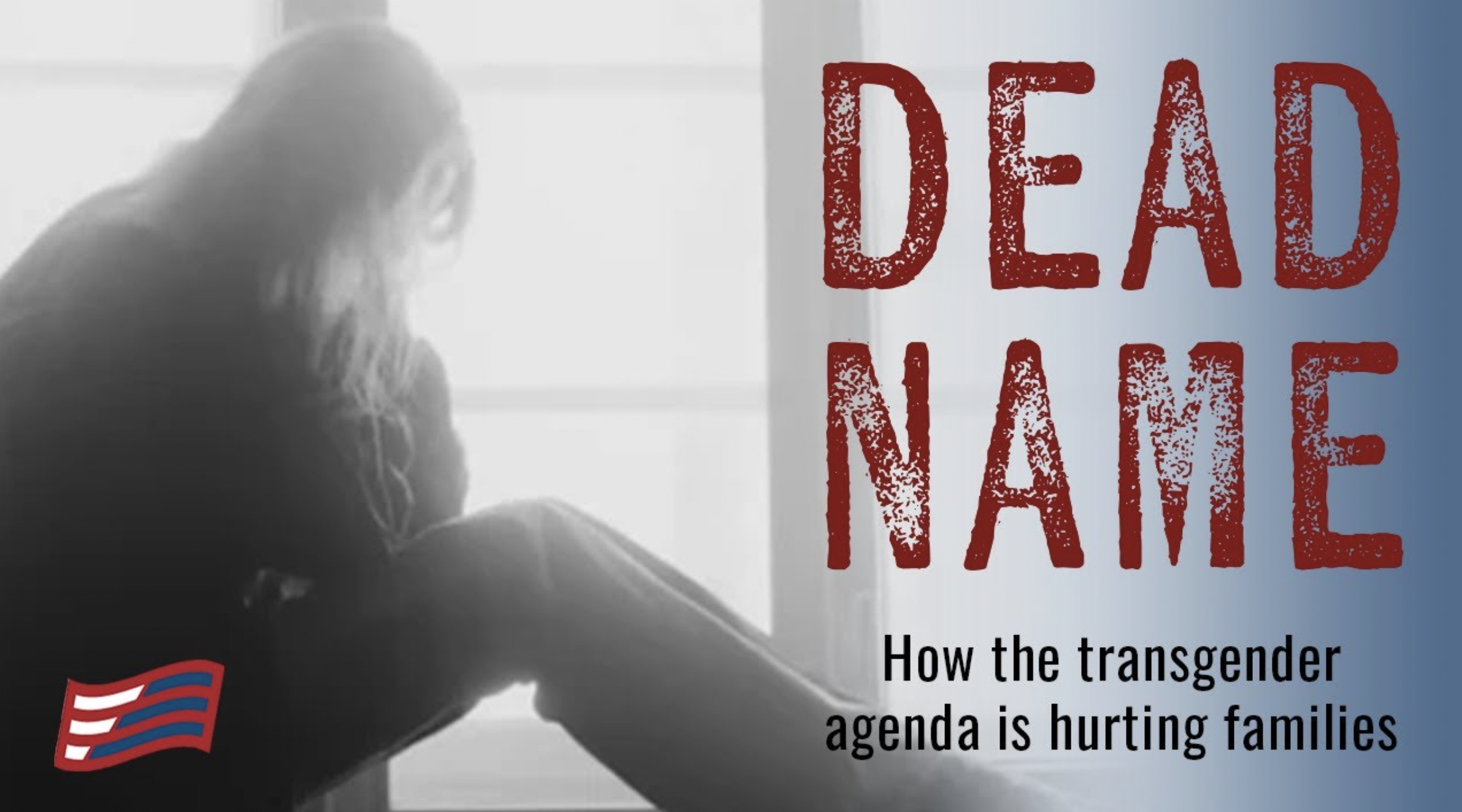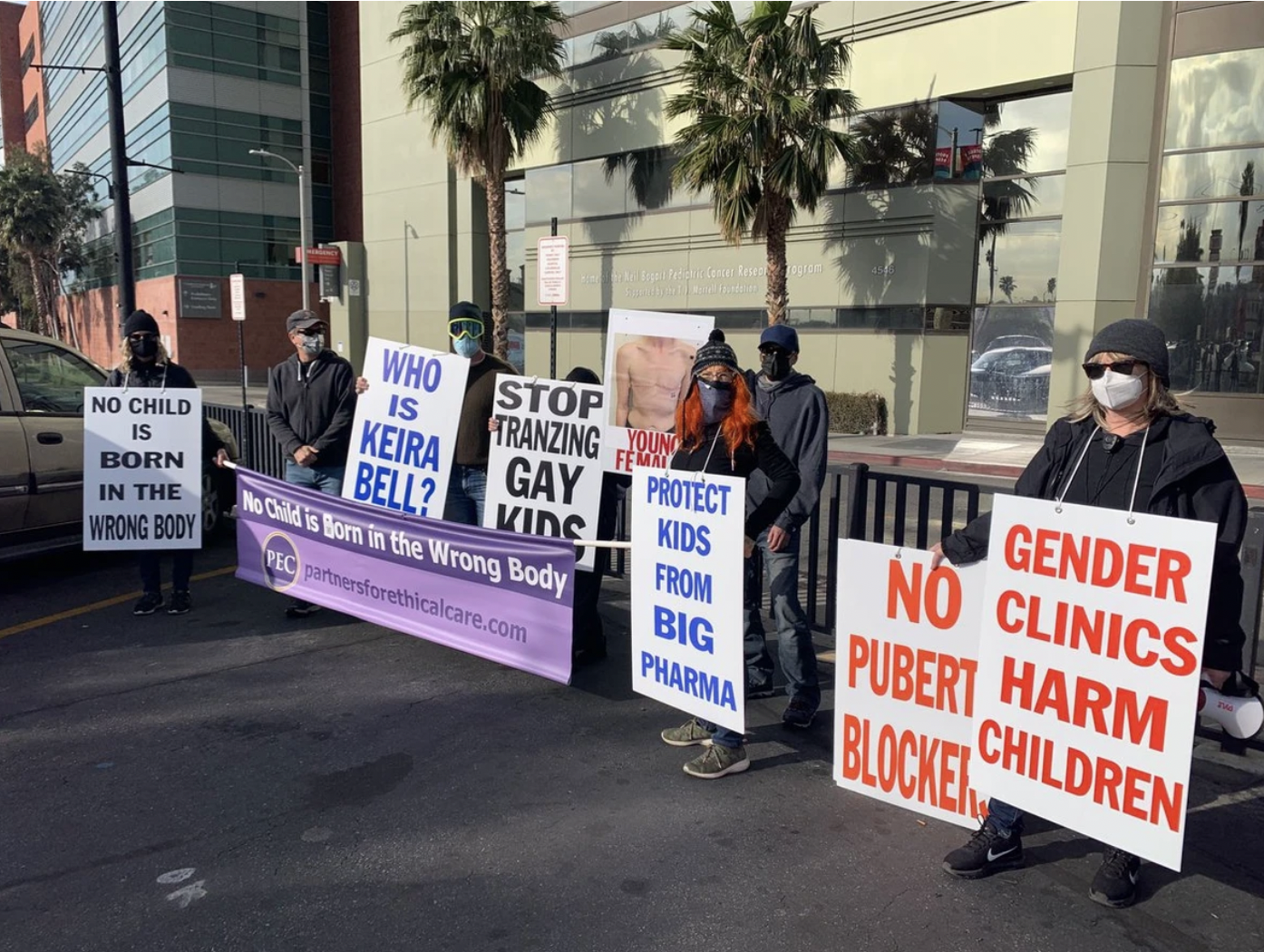
“No debate” is a common response offered to those who challenge gender identity ideology, yet a debate is happening at last. A new documentary has been released — then promptly censored — giving a platform to a group almost wholly ignored by mainstream media: the parents of children identifying as “transgender.”
Dead Name, released in December by BrokenHearted Films, shines a timely spotlight on parents of children who claim to be the opposite sex, encouraged by an entire industry of therapists, doctors, activists, and LGBTQ charities. Given the alarming number of children suddenly identifying as “transgender” in North America, their parents are surely a group worth hearing from. And yet, Dead Name was removed from the popular video platform Vimeo on January 23, after just 34 days.
Dead Name’s director, Taylor Reece, told me via email that when Vimeo removed her 50-minute documentary she received an email from the company, stating, “We have unsuccessfully published your film.” Success is relative, of course, but Reece says viewers from 16 countries bought her documentary. The Federalist’s Tristan Justice contacted Vimeo about the film, and the company told him via email:
“We can confirm that Vimeo removed the video in question for violating our Terms of Service prohibiting discriminatory or hateful content. We strive to enforce these policies objectively and consistently across our platform.”
I reached out to Reece, asking her to respond to the accusation of “discriminatory or hateful” content. She refuted this, saying, “I’d like to emphasize that there is absolutely no hate speech in our film.” She’s right.
Given that Dead Name highlights the plight of and effects on the immediate family of children labelled “transgender,” and addresses the harms of “transgender” ideology, it appears Reece’s documentary has been censored for revealing flaws in and harms of transgender ideology. Reece is now just the latest in a long line of women censored for questioning the medicalization and mutilation of children’s bodies in the name of “trans rights.”
Most of Dead Name’s running time is dedicated to interviews with three American parents, identified by their first names only: Amy, Bill, and Helen. Their stories are heartbreaking, and likely to inspire distress in any parent who fears their child might get caught up in the social contagion of transgenderism.
The film also includes brief interviews with Stephen Levine, a Clinical Professor of Psychiatry, and Christian Post reporter, Brandon Showalter, as well as brief interviews with other parents of children swept up in an ideology that convinces kids and teens they may have the “wrong body” or that any distress they are experiencing can be resolved through changing “gender.”
Amy, Helen, and Bill come across as thoughtful, caring parents and their stories share many commonalities. They describe their children being influenced by others and becoming withdrawn, learning about transgenderism as a “solution.” They describe feeling alone and powerless to protect their children, and being treated like terrible, unsupportive parents for questioning their child’s new identity. They describe this period of their life as a nightmare. Amy says of her teenage daughter, “She would end up verbally abusing me. It got really ugly… I can’t even begin to say the names that she called me.” They remark on the incongruity of others presuming to know their child better than they do. They discuss being let down by mental health professionals seemingly intent on rushing their child to “transition” to the opposite sex. The sadness and distress is palpable.
Bill says, “This is about protecting my kids. I don’t want another parent to ever have to go through what I’ve been through.” Amy also feels like she can help other parents to navigate these kinds of situations, saying of her parent support group: “I realized that I can be a voice. I can be there for other parents that are going through this, and that’s important to me.”
Bill explains that professionals’ hands are tied by the trans-affirmative model and insufficient attention is given to other paths, such as the watchful waiting approach. He, Amy, and Helen say the trans-affirmative model is portrayed as the only way.
They reflect thoughtfully about wrong-body ideology and ask valid questions our societies are failing to answer. Amy asks her interviewer, “Where does our species go if you can cut off your body parts like this?” She wonders what her grandmother would think of all this and asks: “How are we getting so far from reality?”
Helen describes how, in 2014, she was sidelined when her four-year-old son Jonah was “socially transitioned” at school. Soon after separating from her wife, Helen received a call from Jonah’s daycare’s director, informing her that Jonah claimed to be a girl. This call left Helen shocked and confused. Shortly after, the preschool sent a letter to all the parents, informing them they had a new student named Rosa (Jonah), and that the school wanted the parents to support “her.”
Helen received the same letter as the other parents, as though Jonah were not even her son. The preschool, she felt, seemed to be on a crusade to get everyone using Jonah’s new female pronouns. Says Helen, “It was all about me having to accept this… ‘It’s what Rose wants’.” No one at his school challenged the claim that Jonah was now the opposite sex.
Helen says Jonah’s kindergarten teacher told him about sex-reassignment surgeries. He was six years old. Helen began to look into the impacts of puberty blockers and cross-sex hormones, and how these things lead (often very quickly) into cross-sex surgeries. She realized the social transitioning which had begun at preschool could lead to permanent physical changes to her son.
Jonah adopted two identities to navigate the world: a “boy identity” for his time with Helen and a “girl identity” he adopted at school and expressed when he was with Helen’s ex-wife. Helen agreed to call him Rosa and gave him the choice of “boy clothes” or “girl clothes,” but believed using female pronouns would be harmful to him, saying, “The truth is he’s not a transgender girl.” She tells her interviewer that Jonah’s well-being and mental health have been sacrificed.
American-Canadian clinical psychologist and sexologist James Cantor attended Helen’s child custody battle with her ex-wife, as her witness. Helen won sole legal custody of Jonah, however, she cannot stop her ex from calling him by a girl’s name and using female pronouns for him.
Amy, the mother of a teenage daughter, recounts how in 2015 her daughter suddenly announced she was “trans” and said she needed a new name. She had shown no signs of childhood gender dysphoria, but had begun hanging out with a friend that identified as “transgender.”
Amy’s daughter’s desire to “transition” to the opposite sex led to terrible rows between mother and daughter as Amy questioned her new identity and intention to begin hormone treatments. Her daughter threatened suicide and their disagreements led to fights between Amy and her husband. A meeting with a counsellor who treats gender non-conforming youth resulted in another blow-up, and Amy’s daughter moved out of the family home.
Bill tells us of his son Sean’s difficult life, cut short. At two years old, Sean was diagnosed with cancer, and his leg was amputated. At five it was discovered he had a form of leukemia, which resulted in a bone marrow transplant. When he was eight, Sean’s older brother died of a heroin overdose. Sean’s mother also died. What’s more, Bill says Sean likely knew he was sterile due to the chemotherapy. Clearly, Sean had suffered much trauma during his childhood — trauma Bill believes played a part in Sean embracing gender identity ideology. Bill maintains that Sean gave no signs of early childhood dysphoria.
Following these traumatic events, Sean was diagnosed with stage four colon cancer. According to Bill, it was at this point that Sean wanted hormones “to become a girl as quick as possible.” Sean set up an appointment with an endocrinologist at the hospital, which was subsequently cancelled by the endocrinologist (who had been following Sean for some time), as cross-sex hormones would be fatal to Sean on account of the cancer.
Bill believes Sean fell in with the wrong crowd during his freshman year at college. He says Sean was planning to move in with three girls who were “involved heavily in the trans thing.”
We learn that Sean died while at college. A police officer sent to Bill’s home informed him his “daughter” had died, confusing Bill, who initially assumed the officer had the wrong parent. When he viewed his son’s body at the funeral parlor, Bill didn’t recognize him, leading him to believe Sean was taking cross-sex hormones at the time of his death, despite his doctor refusing to prescribe them.
Footage of a Partners for Ethical Care (PEC) protest outside a gender clinic shows parents holding signs reading, “Gender clinics harm children,” “No child is born in the wrong body,” and “Stop transing gay kids.”

Psychiatrist Stephen Levine, who is also a Genspect advisor and who published a paper called Reflections on the Clinician’s Role with Individuals Who Self-identify as Transgender in the Archives of Sexual Behavior in September 2021, explains:
“I’m well aware of the anguish of the parents and it’s not just a one-time anguish that is settled by kind words from the doctor. It’s an ongoing, continued anguish. Many of the parents I’ve seen have gone into therapy as a result, have become depressed and anxious, can’t sleep and so forth. And they don’t know what to do… But I think for every parent who gets involved wisely with other parents there are probably more parents who just deal with this by themselves, in shame and in horror and in sadness.”
Brandon Showalter has been covering the fight against gender identity ideology at The Christian Post for some years now. He tells the interviewer:
“What I would see consistently is that this ideology ruined everything it touches. And that the heartbreak and the devastation of parents and families was just staggering… To be forced to watch the slow-motion dissociation and disintegration — chemical disintegration sometimes — of their own children, was just like living in a horror movie. And that has only increased through the years.”
Mothers of trans-identified children interviewed near the end of the film express how gender identity ideology alienated their children from them, teaching them their parents were the enemy if they were not fully supportive of the child’s wish to attempt a medical “transition” to the opposite sex. They observe that the clusters of children identifying as trans should raise a red flag — but doesn’t — and that being “transgender” is now a social currency for children.
A “dead name,” we learn, is a term used by proponents of trans ideology to refer to one’s name before it was changed to correspond to the new, opposite-sex identity. In most cases the “dead name” is the one given by one’s parents.
Dead Name shines a spotlight on the devastation trans ideology leaves in its wake. It is dedicated to the memory of Sean Mahoney and can be purchased for viewing at deadnamedocumentary.com/
Alline Cormier is a Canadian film analyst and retired court interpreter with a B.A. Translation from Université Laval. In her second career she turns the text analysis skills she acquired in university studying translation and literature to film. She makes her home in British Columbia and is currently seeking a publisher for her film guide for women. Alline tweets @ACPicks2.
